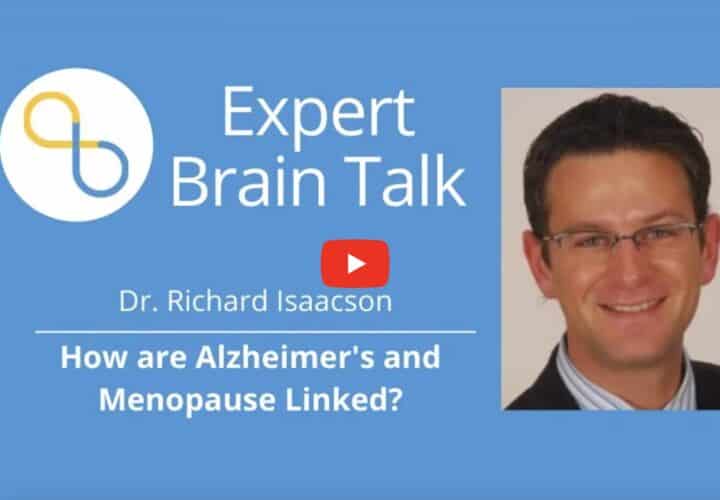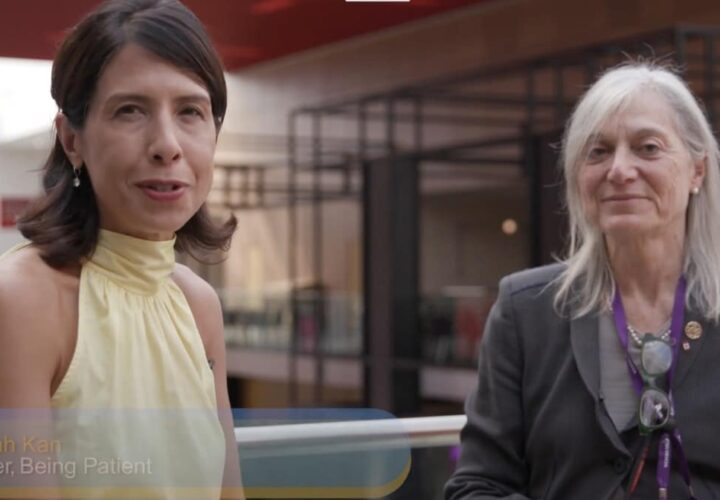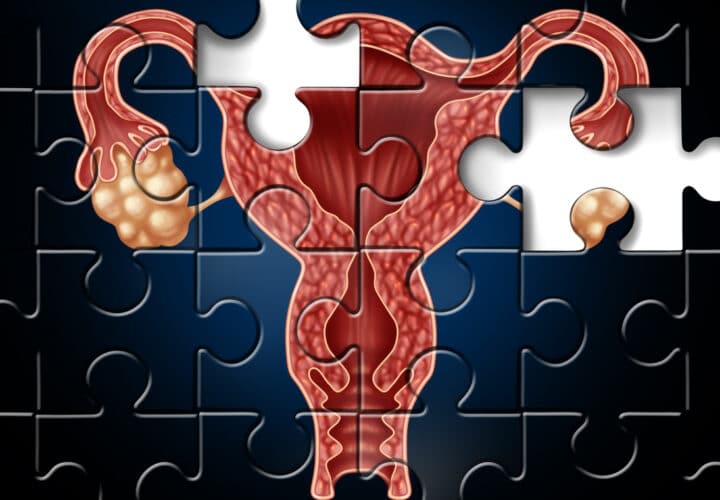A 2020 study probes the link between Alzheimer's and menopause.
As research into Alzheimer’s disease progresses and awareness grows, one fact remains consistent: women are disproportionately affected by the disease. Several theories exist, but a 2020 study suggests that the link between Alzheimer’s and menopause, a part of aging for most women, could be the answer.
Being Patient spoke with Dr. Richard Isaacson, a neurologist and director of Weill Cornell University’s Alzheimer’s Prevention Clinic, about his involvement in the study on menopause and the role of the link between Alzheimer’s and menopause in future research.
Key points:
- Two thirds of all Alzheimer’s cases are women
- Tau protein tangles spread more quickly in women’s brains than men’s
- Research has not determined why Alzheimer’s influences male and female brains differently
What do we know about the relationship between estrogen and Alzheimer’s disease?
Being Patient: What is it about our hormones that’s related to the brain? What do we know about the connection between estrogen and the brain?
Dr. Richard Isaacson: Well, we’ll take one little step back. If you were to ask me this question ten years ago, I would have said I have no idea. Five years ago, we started the Alzheimer’s prevention clinic at Weill Cornell and New York Presbyterian back in 2013. It took a couple years to kind of get my feet wet and understand not just how people are doing, but how sex differences go in pre-clinical normal patients who are at risk for Alzheimer’s.
It started becoming much more clear, like you said, that it’s not just because women live longer. Two out of every three brains affected by Alzheimer’s is a woman’s brain, and we used to say we don’t know why. Honestly, I don’t believe that that’s the case anymore. I’m pretty confident that we have significant clues that can not just understand the risk factors, but also how we can maybe intervene to reduce risk. All that being said, there are, I believe, several reasons, and it’s not just hormones.
I think hormones are very important and we’ll talk about that. I’m a physician, I’m a neurologist, I’m a practicing clinician in the Alzheimer’s prevention clinic, so we get a lot of questions: should I be on hormones? What should I take? Should I take a pill? Should I take a cream? When should I start? I’m not menopausal yet, I’m just starting to have pre-menopausal symptoms, I’m done with menopause, should I start now?
These are very common questions, and while I can’t say we have the perfect road map or instruction manual of answers, there are multiple reasons why a woman could be on a different trajectory than a man. Hormones we will definitely talk about, but it’s more than that.
During the pre-menopause transition there are bio-energetic shifts, and what that means is that the brain’s energy pathways change. When that shift happens in certain women they will be on a different fast forwarding road to Alzheimer’s disease, and our goal as a clinician, my goal in the clinic, is to get them off of that road using evidence-based and safe interventions. Is hormone replacement one of those interventions? I’m fairly sure it is, but it’s not a one-size fits all answer. When to start, what to start, there’s just so many questions here and I think I understand it much more now than five years ago.
What happens when our estrogen levels drop?
Being Patient: Estrogen traditionally begins dropping in a women’s mid-thirties. Is it true that different women have different degrees of an estrogen drop? And is there evidence that sharper drops of estrogen, like falling off a cliff, are worse for the brain?
Dr. Richard Isaacson: Sure, so the falling off the cliff analogy is a good one and the thing that immediately makes me think of what would make a women “fall of the cliff” in terms of a precipitous and immediate drop in estrogen levels, the number one thing I can think of is surgical menopause, which basically means a hysterectomy where they take out the ovaries.
Now, in the past 20 years ago and earlier when women got hysterectomies, and there’s a variety of reasons why women have to get hysterectomies, but when you take the uterus out and you take the ovaries out with it and prior to that the ovaries were working and there were some degree of regularity of ups and downs of estrogen which is normal throughout the cycle, when you take that out it’s like falling off a cliff. I don’t know that we have the perfect answers and the perfect evidence, but both the study that we just published and also other studies basically suggest that when you fall off of that cliff, that could be a problem in certain women, in many women, but not all women. And that’s a complicated thing.
Does the woman’s genetics play a role? I think yes. The other thing that’s really important is, did that woman go on hormonal replacement therapy immediately? Okay, that’s important. What was that hormonal replacement therapy? What was the dose? Was there progesterone? Was there just estrogen? What type of estrogen was it? Was it a pill? A patch? A cream? How long did they continue the estrogen replacement for?
If I had to say a yes or no and you boxed me into a corner, is estrogen protective on the brain? Sure, I would lean towards yes. I shake the eight ball, and all signs are pointing to yes. But it’s just not that simple, you know, a woman just can’t just say that “I heard this in this video, Dr. blah blah blah prescribed me estrogen, I want to prevent Alzheimer’s.” It’s, unfortunately, a little more complicated than that. What this study showed is that we kind of understand more now about how hormone replacement therapy, how the pre-menopause transition, how a hysterectomy for example, all these three things might not just affect Alzheimer’s risk but really how they affect brain pathology.
So in the brain we can look at characteristics from the size of the brain if there’s shrinkage in parts of the brain that basically cause or are associated with Alzheimer’s, the hippocampus — the memory center of the brain — we look at the grey matter and the white matter, we look at the size of the brain or atrophy, we look at something called glucose metabolism. If we see hypo-metabolism, well that’s a clue that there could be a problem especially if those are hypo-metabolic reduced energy consumption, and really reduced energy metabolism is a better term in parts of the brain related to Alzheimer’s.
And finally is there amyloid in the brain, amyloid is the pathologic protein that builds up in the brain of people with Alzheimer’s. Is it the cause of Alzheimer’s? I don’t really think so. Is it related to Alzheimer’s? Absolutely, it’s a biomarker that accumulates in the brains of people with Alzheimer’s.
In that study we really showed that women who are in the pre-menopause transition and during menopause and also women that do hormone replacement therapy and other things, we understand now the relationship between those characteristics and brain pathology related to Alzheimer’s. So long story short, it takes a long time to figure this out and I think this study is important because it’s a little bit more clear now.
How does menopause affect memory?
Being Patient: Do we just think that we are losing our memory, or are we actually losing our memory because we’re reaching menopause?
Dr. Richard Isaacson: I’m going to give a collective apology on behalf of most physicians out there because when I was in med school almost twenty years ago we never learned that menopause causes cognitive changes, like that was not even on the radar, like zero. And then we kind of learned that there were some cognitive aberrations but it’s fine, it’s just due to, I don’t know, hormones or whatever, lack of sleep, it’s not real.
And the problem is that I said it’s not real. Well absolutely that’s not correct. These are real symptoms, these are absolutely real, but how I’m going to characterize it is different from what you just said. These are absolutely real, tangible cognitive changes. You used the term memory, memory is a loaded term.
When I’m talking the word memory, I know it’s memory because I do the tests. The problem with cognitive function, is that if your attention is less than it used to be, if your processing speed is lower than it used to be, if your ability to learn new information is less than it used to be, the person may say that they’re having a memory problem, but not necessarily. We test all these different factors, you know there’s downstream and upstream right?
If someone can’t consolidate information and get it into the memory banks, Papez circuit, long-term, short-term, if you can’t consolidate the memory that may be an attention thing or a processing speed thing, that’s not memory. So what I would say here is it’s essential to characterize the exact cognitive change related to the perimenopause transition before jumping on memory and saying, “Oh, I have Alzheimer’s, I think.”
All that being said, there’s certainly some memory dysfunction, because a lot of the time it’s not memory. In the women that have a memory problem during the perimenopause transition, who have multiple family members with Alzheimer’s that have an ApoE4 variant one or two, that’s when I start getting a little worried.
That’s when I say, “How is your exercise? What is your cholesterol? I need to know everything about you. Not just how many days a week you are exercising, what are you doing? What is your average heart rate during your exercise? Oh, you’re on an elliptical but you’re texting, no that’s not intense exercise enough. Oh you’re not doing strength training, what do you mean, you need to build muscle, because if you don’t build muscle you’re not going to increase your metabolism.”
I get really serious with women who truly have an objective memory problem, we do like multiple different cognitive tests in our cognitive battery 45-55 minutes, if it’s a memory problem, I’m legitimately concerned and and I will predict that there is a bio-energetic change in the brain that we can really detect. So, I completely buy it. I think it’s totally real, but we just have to be careful how we characterize it.
When a woman is having these symptoms I also really dive deep into sleep. Sleep disturbances through the perimenopause transition are like absolutely so essential at characterizing in our clinic, we have over fifty people wearing this risk biosensor and we just published on this in the journal of Prevention of Alzheimer’s Disease where we can use biosensor information and put it in an algorithm to predict how the brain is functioning.
It’s actually pretty cool stuff but we can track sleep, and not just total sleep, it’s how long does it take to fall asleep, deep sleep, how much REM sleep there is, we look at cardiovascular measures like something called heart rate variability, is a woman ruminating about their symptoms, are they having repetitive negative thinking which fast forwards amyloid and tau deposition which fast forwards shrinkage of the memory center of the brain.
So in women during the perimenopause transition, it’s not just about the hormones, it’s about everything that’s downstream from the sleeping disturbed by the hormones, so I’m ruminating about it, is this a serotonin problem, is it an estrogen problem, we need to talk about pharmacological and non-pharmacological approaches, sleep hygiene, could we take a supplement, are you exercising, are you having caffeine before bed? There’s so many different things we need to address for a precision approach.
Edited for clarity.







Menopause does not cause Alzheimer’s disease and estrogen “replacement” doesn’t prevent it. The WHI, which evaluated Premarin and Prempro, showed a higher risk dementia as well as increased rates of brain atrophy. The recent KEEPS trial in newly menopausal women also showed increases in brain atrophy and white matter hyperintensities in women on either Premarin or transdermal estradiol vs placebo. Premarin caused impaired verbal learning and estradiol led to impaired event recall and more subjective memory complaints. Another trial called ELITE testing oral estradiol in younger vs. older women menopausal women also showed no cognitive benefits in either group. And finally a massive Finnish observational study in 2019 showed a higher risk of Alzheimer’s in long term users of estradiol-based HRT. The blame-everything-on-menopause ship sailed years ago. Time to find real solutions to the growing Alzheimer’s burden and stop trying to resuscitate estrogen.
Very interesting
and instructive!
I like read news about reserchs and lern Things about health of women and men.